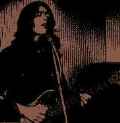|
Mailing & Discussion List  |
|
|
|
|
|
|
| Forward
to next article |
 The
period during which he was apparently “missing”, or at least ‑
uncontactable, in Ireland was spent variously rehearsing the new album
and playing with a showband, but now, finally, he was back in London.
The
period during which he was apparently “missing”, or at least ‑
uncontactable, in Ireland was spent variously rehearsing the new album
and playing with a showband, but now, finally, he was back in London. – there's a fair scope of those
songs in what I've been doing and there's a few songs that are slightly
humorous in the way that I did ‘Banker’s Blues’, that kind of
approach. Not horse jokes, but laconic kind of humour.
– there's a fair scope of those
songs in what I've been doing and there's a few songs that are slightly
humorous in the way that I did ‘Banker’s Blues’, that kind of
approach. Not horse jokes, but laconic kind of humour.|
Mailing & Discussion List  |
|
|
|
|
|
|
| Forward
to next article |